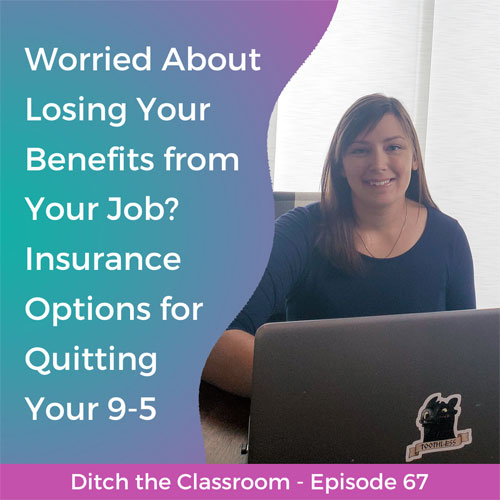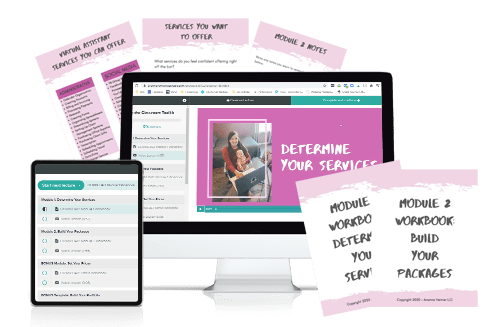
Episode 299: 3 Common Misconceptions Teachers Have About Quitting Teaching
In this episode of the Virtual Assistant Mama podcast, I’m sharing 3 common misconceptions that teachers have about quitting teaching.
One of the number one questions I get asked by people in the Ditch the Classroom Facebook community is “What about insurance?” Many people think it’s going to be ridiculously expensive to get their own insurance and that’s what keeps them from leaving their 9-5, but this isn’t necessarily the case.
In today’s episode of the Ditch the Classroom podcast, I’m breaking down some affordable insurance options for you to consider as you’re preparing to quit teaching and start your Virtual Assistant business.


Grab your Ditch the Classroom Toolkit for only $47!
Sign up for the free Virtual Assistant Workshop, the Ditch the Classroom Toolkit, or Teacher Turned Freelancer Academy.
Have any questions for me? Feel free to send me an email at arianna@ariannavernier.com or on Instagram @arianna.vernier! I love chatting with y’all and helping you hit the ground running. Are you ready? Let’s go.
Love,

Full Episode Transcription:
(00:07):
Hey, hey sister-friends! Before we jump into today’s episode, I want to extend a special invite to you. Are you wondering if virtual assistance is something that you can even do, or maybe you don’t even fully understand what it is and how it can impact you? Then I want to invite you to join my free, How to Become a Virtual Assistant workshop. In this workshop, we’re really going to dissect what a virtual assistant is, what services you can offer as a VA and helping you figure out what services would light you up every single day, where to find paying clients so you can replace your teaching income faster, and the top three mistakes that new virtual assistants make and how you can avoid those. Now, if you are ready to get your feet wet and really start diving in and take that first step into virtual assistance, then I invite you to grab the Ditch the Classroom toolkit. This is really going to give you the foundational steps you need to start landing those first few clients and really see if this is something that you can do or not. However, if you are ready to go 100% full-on in on this thing and ditch the classroom completely in six months or less, then I invite you to skip the other two steps and join the Teacher Turned Freelancer Academy. So in TTFA, you’re going to get all of the systems, the accountability, the tools, the templates, the sisterhood, everything that you need to make virtual assistance your full-time job, working from home with your babies. TTFA comes with 10 modules. Each module has bite-size, implementable and actionable videos and workbooks that will allow you to take your virtual assistant business from zero to 60 ASAP saving you time, saving you money, saving you energy.
(02:59):
If any of these sound like they’re something that you need in your life, I invite you to go to ariannavernier.com/resources. Now, for today’s episode, I’m answering a question that I get a lot. So when people join our free Facebook community, one of the number one questions they ask is, what about insurance? What do I do if I’m quitting teaching, what am I supposed to do about my insurance? A lot of people have kind of this misconception that it’s going to be ridiculously expensive to get insurance outside of a job. And that’s, what’s keeping them leaving their nine-to-five.
(04:04):
However, this is not necessarily the case. So I’m gonna be sharing some options with you today that you can consider if you’ve been on the fence and the only thing holding you back is that insurance. Now, I do need to make a disclaimer. I am not an insurance broker. So I do recommend working with one to make sure that your specific needs are met, but I’m just gonna kind of walk you through some of the options that are out there. Before we even jump into the actual options. I want you to consider something; in many situations, you actually are paying monthly for your insurance, it just gets deducted straight from your paycheck before it hits your bank account. So you don’t even see that amount taken out. So, the only difference with virtual assistance is you would have to specifically set aside that income yourself, rather than somebody taking it out of your paycheck before you notice.
(05:10):
But there’s really not a big difference. It’s just you noticing versus you not, okay? So that’s just something to consider. Now, every state has different plans, accessible to residents. So you’ll really need to do a little bit of research. And this is where an insurance broker can be very helpful. Different plans have different pros and cons. So some plans have a low monthly premium, but then your deductible might be higher. Others have a high premium and small deductible. Some things to consider are, are you likely to hit that high deductible? If you don’t have many health issues, you’re not pregnant, you don’t have a lot going on in the health world, then it might be better to consider the lower premium plans and the higher deductible, that way you’re paying less per month. Now, if you are more likely to hit that high deductible, then you wanna pick the lower deductible and then the higher premium.
(06:19):
Okay. I know that’s a little confusing. So hopefully that makes sense. Now, what you can do as well is set up a health savings account or an HSA account. These are often able to be set up for high deductible plans, but there are requirements that the plan needs to meet, which are set by the IRS. So again, this is where an insurance broker can help you. Now, HSA contributions can be tax deductible. So when you contribute to an HSA account, you don’t have to take your taxes out of that amount first. Okay? So if I got paid a hundred bucks and I’m putting that straight into my HSA account, I don’t have to take out my 25% for tax or 25 to 30% for tax. But if I’m just putting that same a hundred dollars straight into my own personal banking account, I need to set aside that 25 to 30% for tax.
(07:17):
So with HSA, you don’t have to take out that tax amount first, but you can only spend that HSA money on medical purposes. And also there is a maximum amount that you can contribute per year to your HSA. So you’ll need to figure that out as well. Now, one option for actual insurance, you can get marketplace insurance, which is available in every state and it’s operated by the federal government. With marketplace insurance, depending on your income, you might be able to be subsidized, which means have tax credits supplied that will reduce your payments. So you can find plans as low as $200 a month with no deductible. Now there’s all kinds of different plans out there. So again, it’s gonna vary on what you need. Grab an insurance broker to help you. One other option to consider is co-ops. Now co-ops are where you pay into the account each month and you’re ultimately paying for other people’s direct needs that month. You’ll still get an insurance card and it operates like insurance, so you can use it when you have doctor’s appointments, pregnancies, emergencies, etc. But really it’s like everybody putting their money into a pool each month. And then other people on the plan can then use that money for their medical needs, but you’ll also be able to use it for your medical needs as well. So this would probably be our choice, mine and my husband’s choice, when we eventually do need it. Right now, he’s still working his full-time job so I do have my insurance through him. So if you have a spouse that you can still get insurance through, that’s another option. But once I eventually bring him home and he doesn’t have to work anymore because of my business, we are going to be going through a co-op – most likely – we’ll go through a co-op called Medi-Share. Now Medi-Share – I don’t know how you say it – is a Christian program.
(09:26):
So the only qualifications that you have to have are to fill out a moral integrity or a faith survey, because they just wanna make sure that, you know, Jesus as your personal savior, since it’s a Christian based program. I personally know a family of six, who is part of the Medi-Share program and they pay 550 a month with a $6,000 deductible. They could have gotten it as cheap as 300 a month if they chose higher 12,000 deductibles. So again, that’s where you wanna kind of balance out. Am I gonna, am I likely to hit that high deductible or not? Now again, I do wanna say I’m not an insurance broker. So I really highly recommend working with one when you’re ready to take that step. But I just wanted to show you that there are options out there and they are not as pricey as some may think. And that shouldn’t be the only thing holding you back. So if you have any questions, come post them in our Facebook group, facebook.com/groups/ditchtheclassroom, and I will be more than happy to try to help you find the answers you’re looking for. But I hope this gave you some things to consider. And yeah, I’m happy to answer any questions you have. I hope you guys have a wonderful week and I will see you back here next Tuesday.

In this episode of the Virtual Assistant Mama podcast, I’m sharing 3 common misconceptions that teachers have about quitting teaching.

In this episode of the Virtual Assistant Mama podcast, I’m sharing the best strategy for getting your Virtual Assistant business up and running. It might surprise you!

In this episode of the Virtual Assistant Mama podcast, I’m sharing whether you can do Virtual Assistant work as a side hustle or not.